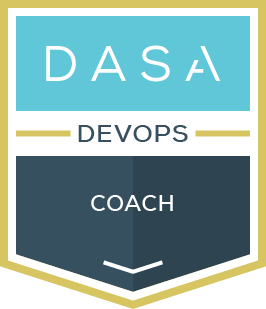As DevOps coaches, navigating the maze of scaling in vast organizations requires not just technical acumen, but also a deep grasp of human and organizational dynamics.
This summary offers a structured snapshot of the key takeaways from The Art & Science of DevOps Coaching episode 2, “Scaling DevOps: Coaching Strategies for Large and Complex Organizations”. It covers essential themes such as understanding the imperative of scaling DevOps, overcoming challenges, implementing effective strategies, and the pivotal role of coaches in driving transformation.
A valuable tool for both aspiring and seasoned DevOps coaches, this summary refines your coaching approach by revisiting critical insights and fine-tuning your methodologies. It equips you with the understanding needed to proficiently handle the complexities of scaling DevOps in larger, intricate organizations.
Understanding the Need for Scaling DevOps
The initiation of scaling DevOps begins with a well-articulated ‘why’, that is the compelling case for the need to scale. As organizations strive to build coherent products, teams often find themselves at the threshold of their cognitive load. At this point, scaling becomes a necessity rather than a choice. However, before stepping into the ‘how’ of scaling, it’s crucial to comprehend ‘what’ exactly is to be scaled. This typically involves expanding and adapting DevOps practices, principles, tools, and culture to meet the needs of more than one team. It becomes a process of scaling the ways of collaboration towards a shared goal, a joint product creation venture that invariably involves multiple teams working or aspiring to work in DevOps.
However, the reality of scaling is not devoid of complexities. In an ideal world, teams would operate independently, but practical scenarios dictate the need for coordination and handling of dependencies. Therefore, the challenge is to find ways to reduce the cognitive load, possibly through simplification of processes, product, or automation. At the core of it all, it’s about managing everything at a pace that aligns with the customer’s needs. Scaling is not only about increasing capacity but more about refining ‘how’ teams relate with each other, ‘how’ they deliver, and ‘how’ they interact both within and outside their teams.
Building a Foundation for DevOps Scaling: Integrating Sociotechnical Theory and Team Dynamics
Scaling DevOps requires a deep understanding of sociotechnical theory and effective team dynamics. Sociotechnical theory highlights the importance of balancing organizational structures, systems, procedures, and technology (medium-term aspects) with people, culture, and goals (long-term aspects). It underscores the interconnectedness of technical and social elements in an organization.
Simultaneously, the process of scaling DevOps relies on how well teams collaborate towards a shared goal. This collaboration is enhanced by a clear understanding of the product or service being developed. Therefore, scaling DevOps extends beyond the expansion of practices—it involves fostering efficient team interactions and a comprehensive understanding of the product under development.
Breaking Barriers: Confronting and Conquering Scaling Challenges in DevOps
Scaling DevOps can be confronted with several hurdles:
- Firstly, managerial skepticism often poses a significant obstacle. This can be effectively counteracted by addressing their apprehensions and facilitating candid dialogues that highlight the merits of the transformation.
- Secondly, progress can be impeded due to the underestimation of the full breadth and depth of the transformation. To counter this, it’s essential to adopt a comprehensive perspective of the transition, actively involving all teams. This approach will provide the necessary clarity and drive momentum forward.
- Finally, the resistance to change can be deftly managed by advocating for collective responsibility and ownership of the transformation. By framing it as a cooperative journey towards enhancement, teams are more inclined to engage in a constructive manner.
Efficiency and Iterative Learning: Scaling DevOps for Success
As DevOps scales, the foremost objective is deciphering the intricacies of both official and unofficial (shadow) communication patterns within teams and nurturing a culture of iterative learning fueled by constant experimentation.
The role that management plays is not only integral, but transformative. Managers should steer teams towards self-sufficiency in problem-solving, a method that necessitates comprehension of the situation at hand before stepping in, since solutions often originate from those working at the grassroots level.
In orchestrating workflows, the emphasis must be on the holistic system, rather than just its individual elements. This calls for an assessment and enhancement of process efficiency, which in turn enables a seamless flow of both information and value throughout the system.
Finally, the importance of continuous learning cannot be overstated. Striking the delicate balance between granting teams the autonomy to discover their own unique work methods and maintaining a degree of standardization within the DevOps value stream is essential. The key lies in comprehending team needs and discovering common-ground solutions, which forms an essential facet of this process.
The Essential Role of Coaches in Driving Transformation and Cultivating a Culture of Continuous Learning
Coaches are instrumental in the process of scaling DevOps. They must embrace skepticism and rejection, utilizing these sentiments to fuel transformation by stimulating powerful, forward-driving discussions. Additionally, coaches foster an environment of iterative learning and continuous improvement, endorsing teams to experiment, learn, and adjust their processes accordingly. A central part of their role is managing disappointment. This involves empathizing with teams, understanding their concerns, and working towards consensus and solutions that align with the overall goals.
They must remember the human element in these transformations. As systems are made of people, coaches need to treat changes with an agile, human-centered approach, ensuring that transformations are both successful and sustainable. In essence, coaches in DevOps transformations serve as change agents, fostering a culture that values continuous learning, collaboration, and individual growth.
Strategic Alignment and Comparative Evaluation: Selecting an Optimal Scaling Framework for DevOps in Complex Organizations
The selection of an ideal scaling framework for DevOps in complex organizations requires a deep understanding of the organization’s objectives and needs. Evaluation tools, like DASA’s workshop on Scaling DevOps that enables the comparison of various scaling frameworks, allowing companies to align their strategic vision with a suitable scaling methodology, are beneficial for comparing different scaling frameworks and their alignment with the company’s strategic vision.
However, the chosen framework’s implementation is not a one-time thing. It requires continuous moderation and assessment to ensure it meets the evolving needs of the business. Balancing compatibility, suitability and adaptability leads to sustainable DevOps transformation.
Strategies for Thriving in the DevOps Era
Achieving a successful DevOps transformation hinges upon four primary pillars:
- Starting Small: begin the DevOps transformation with a small, manageable project or team. This enables risk mitigation, provides valuable learnings, and allows for more responsive adjustments. Gradually scale up based on insights gained, ensuring a tailored and effective approach to each unique scenario.
- Clarity: it involves not only understanding the current state of affairs but also establishing crystal-clear transformation objectives. By formulating flexible strategies, organizations can actively monitor their progression and make necessary course corrections along the way.
- Consistency: to ensure consistency, it is critical that all teams understand and utilize the same terminology. This uniformity in communication avoids confusion and fosters effective collaboration, facilitating a shared understanding and minimizing the potential for misinterpretation.
- Alignment: it ensures every team within the organization aligns their efforts towards the shared transformation goals, promoting the smooth operation of the organization as a united entity.
Conclusion
The journey to effectively scale DevOps in large and complex organizations is a multifaceted endeavor that calls for clarity, consistency, and alignment. Our knowledge session provides a condensed understanding of these key aspects, shedding light on the challenges and the strategies to overcome them.
As DevOps coaches, you play a pivotal role in navigating this transformation. Your unique ability to balance technical competencies with a keen understanding of organizational dynamics makes you instrumental in driving change. This summary serves as a valuable tool, equipping you with the insights and knowledge to guide your teams through the complex landscape of DevOps scaling.
The journey to scaling DevOps is a continuous one – filled with learning, adjustments, and improvements. Your role as a coach is to facilitate this journey, turning challenges into opportunities, and driving your organization towards a successful and impactful transformation. Embrace the journey and lead the way to a more cohesive, agile, and efficient DevOps culture.
Join ‘The Art & Science of DevOps Coaching‘ LinkedIn Group.


DASA DevOps Coach
This three-day course is for individuals aspiring to guide teams and organizations through the complexities of DevOps transformations.
